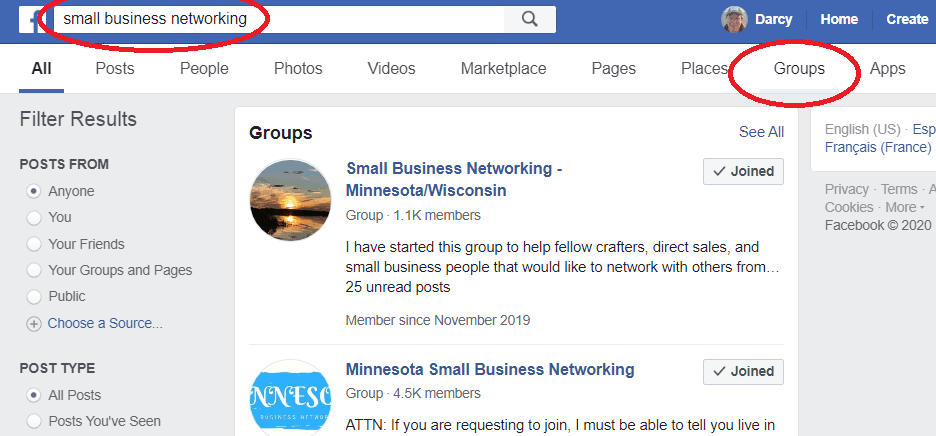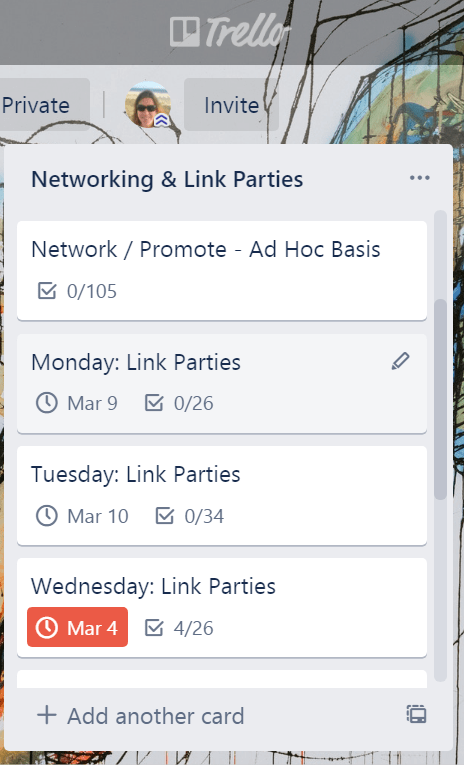[hfe_template id=’6099′]
There are so many ways to market your business, but today I want to talk about the importance of business networking. I started Digital Darcy in July 2019 after almost 20 years of experience in various marketing and project management roles. And, I’m here to tell you that no matter what your industry or job role, networking is essential.
You’ve heard people say it’s all about who you know. I don’t fully believe that, but there is an element of truth to it. My very first clients were people I knew. But, not everyone I know needs my services – so at some point, you have to meet MORE people.
So, let’s get to it. My top five recommendations for getting the best return on the time you spend networking!
1. Start with the people you know.
Tell your friends and family members about your business. They may not need your products or services, but they might know someone who does. Give them a few of your business cards, and encourage them to hand them out if they meet someone who could use your help. Ask them if they know anyone who might need your help. Remind them to keep you in mind if they hear of something. Don’t feel weird doing this. They are your FRIENDS and FAMILY. They love you and want to support you. It’s ok to ask for their help.
You can also network with your existing clients to let them know you appreciate referrals. Give your existing clients some extra business cards and ask them to tell their colleagues about your services. You can consider offering a referral fee to them as an incentive if you would like. Also, don’t be afraid to ask them to leave reviews for you. I receive reviews on Google and Facebook, and I periodically feature them on my website, sales pages, and social media accounts.
2. Create a local presence.
 Do some research about your area and find the local business organizations. This may be the chamber of commerce, the economic development organization, Kiwanis, Rotary, etc. Join these organizations and be active in them. Take advantage of their member benefits and attend their events. I have some resources here, though lots of them are specific to Minnesota. If you are in another state or country, you can find similar resources online that are applicable to your area.
Do some research about your area and find the local business organizations. This may be the chamber of commerce, the economic development organization, Kiwanis, Rotary, etc. Join these organizations and be active in them. Take advantage of their member benefits and attend their events. I have some resources here, though lots of them are specific to Minnesota. If you are in another state or country, you can find similar resources online that are applicable to your area.
Also, be aware of local vendor events. Vendor fairs, county fairs, a farm and home show, a bridal fair, in a vendor room at an industry conference, etc. This will vary depending on what your business is, but keep an eye out for these and be a vendor at them as you are able. If the registration fee to be a vendor is too expensive or doesn’t seem like quite the right fit for you, make plans to attend the event anyway.
Whether you are a vendor or an attendee, make sure you network with all of the vendors that are there and hand out business cards. This is one of my least favorite things to do, honestly. I do it anyway. Read more about this in my Tips for a Great Vendor Booth post.
3. Research businesses in your area, and meet them.
Identify your target market. Then, visit local directory sites where businesses are listed (chamber of commerce, visitor bureau, economic development corporation, county website, etc.) Look for the businesses there that are in your target market, and make yourself a spreadsheet of them. Set it up however it seems most appropriate to you, but you can use this as your prospecting list.
You can do a variety of things in the way of reaching out to them, it kind of comes down to your comfort level and what you feel is right for your business.
You can do a postcard mailing (I did this 3 months ago with a 0% response rate, but your area may be different. And I may still get a phone call or two, assuming that not all 500 of my postcards got thrown in the trash.)
You can try to find as many manager names as possible and call them on the phone to talk about your business with them. You can go to their physical locations and cold call that way, although I would recommend planning to just stop by and say hi and leave a business card if you don’t have an appointment. I don’t like it when people drop by unannounced to my office to sell you something, so I personally try not to do it to others. I think just popping in to say hello is different, though. Depending on your budget, you could always take a candy bar or a small box of fresh cookies to accompany that business card!
Another thing you can do locally is to take your marketing material – business cards, flyers, brochures – and distribute them in the area as appropriate. Lots of businesses have bulletin boards – ask them if you can hang flyers and/or business cards on them. In businesses with a lot of foot traffic, ask if you can leave a few business cards or brochures somewhere visible.
4. Create and maintain a social media presence
Another great way to network with both local and national markets is by creating and maintaining a strong social media presence. Now, this doesn’t mean that you have to create a profile and/or a page on every single platform there is. It’s more important to find where your ideal clients are hanging out and start with those platform(s) first. Planning and consistency are the most important things when it comes to social media, so you don’t want to try to be everywhere and end up not having time to keep things updated.
For most businesses, I would recommend starting with Facebook and adding Instagram as you are comfortable. LinkedIn is also a really valuable networking tool, so if you don’t have a profile there I would recommend getting one. It’s a great way to meet others in your field to share ideas and information, but also to meet potential clients (and/or employers, depending on what your needs are.)
5. Join online networking groups
Facebook is crawling with groups, and there are so many amazing ones for networking! LinkedIn also has some networking groups you can check out as well. On Facebook, you can just do a search at the top for what you are looking for, and then filter your results to “Groups” to find some that meet your needs.

For this, I recommend starting locally and joining the local classified-type groups in your immediate area. Lots of them allow advertisements to be placed, and it’s another way you can try to reach the businesses in your local market. So for this, you would search, “Minneapolis Classifieds” or “Denver Advertisements” for example.
Then, you can look statewide. For example, Minnesota has a lot of business networking groups that allow you to share your business and network with each other. So for that, you would search, “Minnesota networking” or “Colorado business owners” for example. Try different searches until you find what you are looking for.
Finally, you can search on a national basis. There are many women’s networking, small business groups, and more. I’ve found many of them to be amazing, and many of them to be kind of spammy and useless. If you join a spammy and useless one, it’s really easy to just leave the group and move on.
Whichever groups you join, just pay attention to their rules. Some allow self-promotion anytime, some allow it on certain days or threads, and some don’t allow it at all. Even if they don’t allow it at all though, you can still provide value in the group and network with fellow members. Check out this blog post for more tips about sharing value in online networking groups! Note: if it’s a public group, any of your personal Facebook friends will be able to see your posts in the group. I personally prefer the private groups because then only the people within the group(s) can see the posts, but whatever you are comfortable with works!
Keeping Track of My Networking Groups in Trello

For the groups I’m in, I keep track of all of them in a Trello board. I share all about the amazingness of Trello in this post. But, I have an entire board dedicated to networking, and within that, I keep track of my local, regional, and national groups. I note which ones I’m allowed to directly post about my business and which ones I’m not. I also have a “daily” list for each day of the week that lists the group(s) and their share days in it. So, every day I can just go to my list and click to the groups I know have share threads that day. This helps minimize the mindless scrolling, and also helps me make sure I don’t miss anything.
Keep in mind as you are in these that you need to reciprocate with others. Don’t just drop your pitch and link and run. Check out the other businesses in the thread. I’ve met some really great people in some of these groups that have offered some really cool partnerships. That’s what it’s all about.

